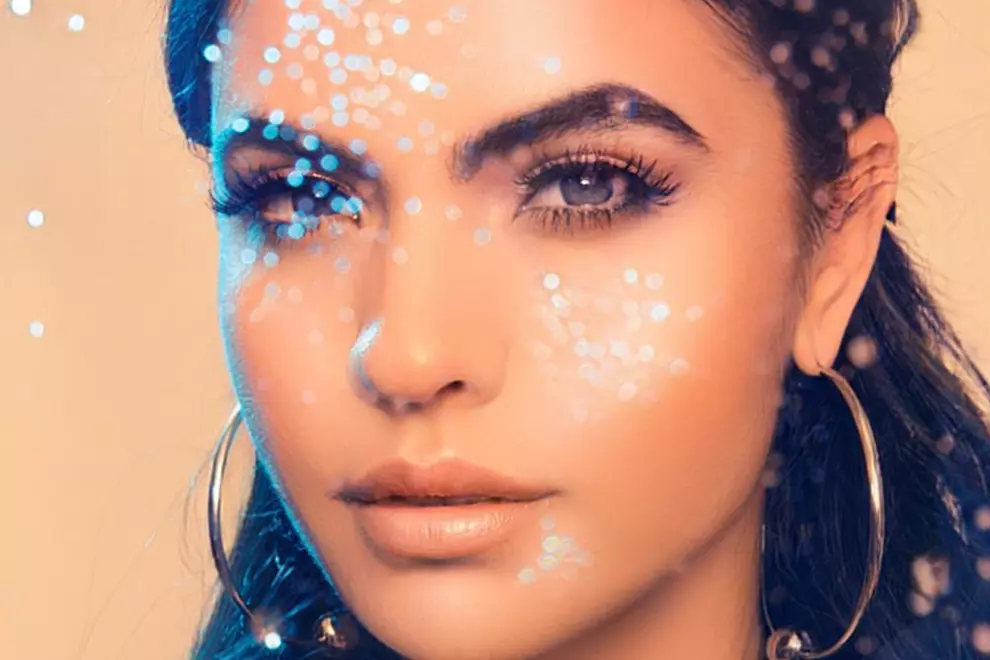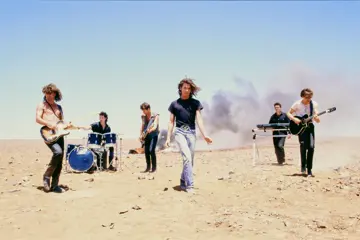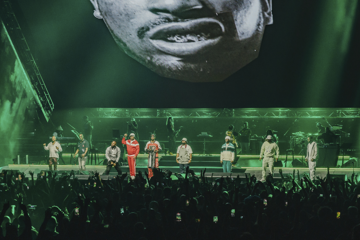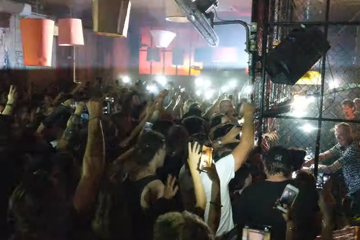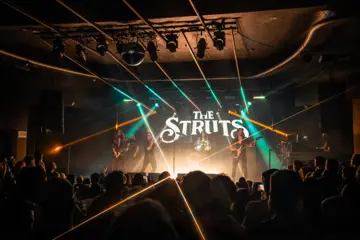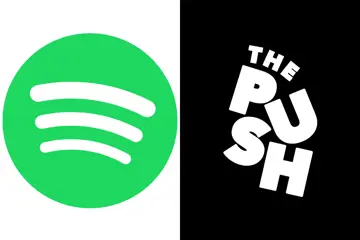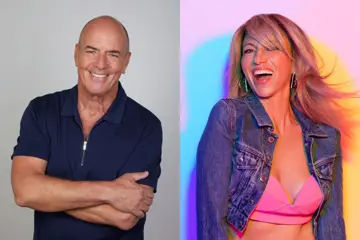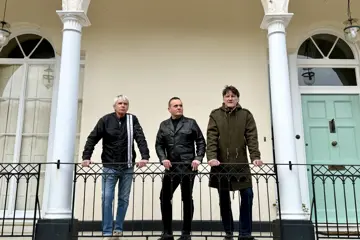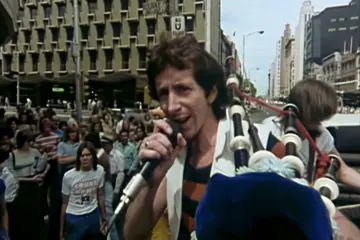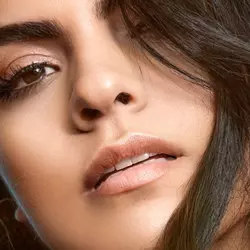 VASSY
VASSYEarlier this month VASSY performed in front of a 20,000+ capacity crowd people as the halftime entertainment headliner during a Denver Nuggets NBA Basketball game, not realising – until she read an article on Billboard – that she was only the second Australian artist in NBA history to do so (after Cody Simpson, who performed Australia’s national anthem at a Cleveland Cavaliers game in 2016).
In the first instalment of our two-part series on Aussie artists leaving the country to find success, we catch up with VASSY over Zoom to unpack why she had to relocate to the States to make the kind of music she wanted to create, and the dance remix that inevitably attracted the attention of future collaborators – including global dance music titans David Guetta and Tiësto – and changed the course of her career, propelling her to the top of the Billboard charts: “I can be proud to say that I did all of this on my own,” she reflects.
VASSY cheat sheet
Born Vassy Karagiorgos to Greek parents in Darwin, VASSY relocated to LA a decade ago. In 2013, she became the first Australian artist to hit #1 on the Billboard Dance Club Songs chart with a solo song (We Are Young) and she’s since topped this chart many more times: 2014’s Hustlin’ (feat. Crazibiza & Dave Audé), both Lost (with Afrojack feat. Oliver Rosa) and Nothing To Lose in 2017, 2018’s Doomsday (with Lodato), 2019’s Concrete Heart (with Disco Fries) and 2021’s Chase (feat. Bonka). VASSY’s songs have been synced widely to film and TV – including Grey’s Anatomy and the trailer for Disney’s Oscar-winning film Frozen – and have also featured in many commercials such as Nickelodeon, Skechers, Victoria’s Secret, Yoplait, Target and Pepsi. In 2021, VASSY joined APRA AMCOS’ The 1,000,000,000 List.
Cracking the American market
“My career started in Australia and it was great, and I was very ambitious. I always had this international perspective and I really wanted to spread my wings, so I moved to America on my own; I had no history here. I don’t recommend it, but it’s something that I did at the time and, you know, it’s very difficult because you move to a country where no one knows you and you start all over again although now you’re in the most competitive industry in the world; it’s just really, really tough.
Don't miss a beat with our FREE daily newsletter
“When I first moved here, networking was a big piece of the puzzle – or a big part of it, absolutely – and that’s hard, I think. And daunting when you’re new to a country and you’re vulnerable and you don’t have your little clique of friends or crew.
“So I don’t know how I did it, but I came here and I put in the work. And then my success story built again, and this time it was an international one. And my biggest global hit records have come out of being in the US.”
Leaving Australia to pursue a sustainable career in music
“[Before leaving Australia], my distribution deal through the label I was signed to was with Universal. And I had a really solid team at Universal and they had booked me on everything – I was doing all the TV shows, the morning shows, I was on national TV, I was doing the big concerts like Australia Day in front of Parliament House in Canberra – and I was all over the place, it was so great! And I actually wasn’t thinking about leaving Australia, because my career was really starting to go places. And then unfortunately Warner took over – that was the time when the labels were shifting – and everyone got laid off and so I lost my entire team. And I lost all my champions – the people that believed in me that were behind my project, they were personally invested – I lost everyone!
“And I think people were in shock, so I couldn’t really reach out to anyone after that because people were then trying to figure out what to do: Where are they going to work? What jobs are they gonna get? So Warner took over and I thought, ‘Alright.’ Well, the team that took over unfortunately were not very invested in Australian acts at the time unless you were a specific type of artist, which I won’t say, but you just had to fit in that box. And, you know, I didn’t look the part, I didn’t sound the part; I just was not the part and it was hard. So it was either you look that part and you be that Australian thing that they want or they just push American acts, like, A-list acts.
“It was really tough, a lot of us artists suffered during that time and unfortunately we had to leave our own country – me and several other artists I know who were going through this – to succeed. And a lot of them didn’t succeed, who I remember were amazing; I mean, they’re still doing cool things. But I was very resilient and persistent, and I just knew that I had something unique: I had to figure out a way to voice it.
“It’s sad [I had to leave Australia to pursue a sustainable career in music] but, you know, the cool thing now is that – having had all the history, and the calibre of iconic, A-list music artists that I’ve worked with – I’m now able to bring that narrative back home and I can start to interlace the narrative with more of a local story.
“But I think Australia’s changed as well, the space has changed and it’s allowing a lot of artists like myself to create the kind of art that we wanna create and there’s a bigger appreciation for the kind of music I’m making. And there’s so much more freedom now in the creative space in Australia, so it’s a really interesting time for a lot of artists back home, I think.”
Plugging Pieces on TV 📺 Who’s heard Pieces?? 🎧
Posted by VASSY on Tuesday, November 22, 2022
“Rejections are simply redirections”
“I mentor a lot of other younger artists, especially female artists, to try to encourage them. ‘Cause, you know, a lot of people have their dreams – whether or not they’re in the arts – and so when I mentor, I try to empower them and really support them to believe in themselves. Rejections are simply redirections – they actually can direct you to your right path; you don’t know it at the time and it sucks, because being rejected hurts your ego and everything, but, for me, [the failures] have been blessings.”
Getting her father's blessing before he passed
“So what happened was, the year my father died it was a really tough year for me because I always wanted to do music and it wasn’t something that was encouraged.
“It was really hard and it was important to me to have that from him, so he gave it to me. But, you know, I had to promise him a couple of things; he’s a negotiator, so it was like, ‘Well, I’m not just gonna give it to you.’ So I had to promise a couple of things and then I could do it [pursue a career in music]. But, you know, of course, Dad passed so he wouldn’t have known if I didn’t deliver on my word. But I did it because of his soul and his spirit, because I know he would know. And up there he’d be like, ‘Aaah, so you didn’t keep your end of the bargain! I’m gonna show you!’ [laughs].
“My Dad died – we lost him very early – and I got his blessing. I’d just finished my career in architecture and this was my moment to really prove to my dad up there that I was born to do this. And when my dad passed away, I had his blessing. And so I think I started my journey then.”
Coming to America
“I had no industry contacts; I was just going back and forth to New York trying to figure it out. I mean, really, when I think back, I think to myself, ‘If I was to do it again, I would not do it. At all. At this point.’ But luckily I did. I just had this drive and possibly a lot of it was fuelled because I was grieving as well, and I was just in this shock mode. And I was working off adrenaline, you know.
“So I just went off for it. But I sacrificed a lot, a lot of those years – they’re hard, you know? You’re on your own. And when you’re an artist – and a woman – in the business, I mean, it’s just, yeah! It can be really hard. Luckily I was very fortunate because I’ve got a very good head on my shoulders. And I’m a little bit of a soldier girl, but unfortunately as an artist you get exploited in a lotta ways. I learnt a lot of lessons, but, thank God I was able to remain authentically myself and just be myself throughout the whole thing, and stand my ground. And I may have missed a lot of opportunities over the years because of that, but I can be proud to say that I did all of this on my own, and I have that credibility, which is very important to me.
“As an entrepreneur, you always have to find and create your next opportunity; it’s not given to you.”
Perfecting the art of self-promotion
“I remember when I was talking about my dreams [in Australia], even then people would – not laugh at you, but have that attitude, as if, ‘Oh, yeah right! Dream on, mate.’ And what I love about Americans is that that they do dream on. They say, ‘Great! Dreams come true here, in this country.’ And it’s true!
“I’m from Darwin and, especially being from the Northern Territory, if you talked about yourself it was seen as in like, ‘Come on! Get over yourself, mate ,’ you know? If you talk like that in Australia, you sound like a wanker whereas here in America it’s really not the case. And Americans are very good at that [self-promotion] so I had to embrace a bit of that and gracefully include it into my pitch [laughs]. But eventually my work just had to speak for itself. And I think it was after I started to get a few things, it was a domino effect.”
The “domino effect” triggered by a string of sync placements
“So it first started off that I was getting a lot of film and TV placements, and then I was getting one thing and then another TV campaign, and Victoria’s Secret and Target and Yoplait and Pepsi and this and that. And it all just opened up new conversations.
“And then from there, I had one song that did so well [The Little Things]. It was on a Target campaign globally, it was in Australia, and I remember thinking to myself, ‘Oh, how interesting would it be if I remixed this and did a dance version of it?’ Because I’ve always loved dance music, but I was more in the indie-pop scene. And it was in that moment when I had done the dance remix and we put it out there: that particular song did so well in the club scene, in the gay circuit; it ended up going number one and that was the beginning of my career in the dance space.”
The story behind that David Guetta collab
“Of course, the record that put me on the map globally was my collaboration with David Guetta & Showtek: Bad was just a monster of a hit; we didn’t anticipate that.
“The way that came about was, I got these producers to do a remix of my very first song We Are Young – the one that put me in the dance scene – and actually we were in the studio working on another idea. I had left for the day and an A&R from Atlantic went by the studio – because they were working on something for Flo Rida – and he had walked in while they were still playing our song, and heard Bad and said to the boys, ‘What’s that?’ And they guys were like, ‘Oh, it’s this artist we’re working with,’ and he said, ‘Oh, my God, I love that! I love that hook, I love that song. Can I play it to Flo Rida?’
“And so I got the phone call, ‘Are you okay with...’ I said, ‘Oh, we haven’t even laid down the verses yet.’ And the guys were like, ‘Well, let’s just roll with it.’ I said, ‘Okay.’ So it went from there. And then it was just a phone call after a phone call, and then basically they were like, ‘Flo Rida loves it. He wants to put it out and keep you on it.’ And then it went to: ‘Do you mind if we play it to Nicki Minaj?’ And I’m thinking to myself, ‘Wow!’ I’m just thinking, ‘Ka-ching, Nikki Minaj!’ you know? [laughs]
“And then I got a phone call about a week or two later, and they just said, ‘Are you in LA?’ I said, ‘Yeah,’ and they said, ‘Can you come down to the studio? David Guetta’s here and he wants to meet you.’ And so I show up at the studio – of course; cancelled my whole day – and David Guetta already had the song and had messed with it, and he played it to me. At that time, he had will.i.am on it from the Black Eyed Peas and, oh! I was on cloud nine and I got so excited. And, you know, we talked in French, ‘cause I speak a bit of French, and I just thought, ‘I cannot believe this is happening! This is so surreal.’
“So I walk out of that studio session thinking, ‘Oh my God, I’m gonna have a record with David Guetta and will.i.am from the Black Eyed Peas! And then a few months after that, David Guetta sends me the updated version and he’s like, ‘Hey, have a listen. I’m gonna drop this next week.’ And will.i.am’s gone and the production changed, and Showtek were on it and it had that hard, EDM sound. And I was shocked at first, but it was a blessing in disguise because the record was just huge.
“So now – of course, naturally – I have lots of relationships with a lot of the producers and DJs in the dance world, but back then I didn’t.”
Joining The Billions+ Club
“And then now [Bad has had] over two billion streams, which, of course, is a very small club… I was awarded by APRA about a year ago for being part of The Billions Club and now I can actually say [Bad has surpassed] two billion, because it’s had one billion [views] on YouTube alone – it’s crazy! A song like that can really change your career.”
From working with Guetta to Tiësto…
“And then, for me, the universe worked in the most bizarre ways because I always wanted to have a record with Tiësto and I’ve always wanted to work with David Guetta. So after I had this record with David Guetta, I have a number one record with Tiësto around the world [Tiësto & KSHMR feat. VASSY – Secrets]! And it blew up literally a year later, around the very same time – not the exact date, but, you know, it was March. And I’m just flabbergasted; it was wild. So those records put me on the map. I mean. they went multi-Platinum around the world and they really opened up a lot of doors for my career as an artist, so…”
Who listens to the radio?
“Radio is vital here [in the States], absolutely. So that’s the biggest thing. And I’m so excited, ‘cause Pieces has already been added to four of the dance stations here in the US. And radio in the US is so intricate; there’s just so many categories. Obviously there’s Top 40, which is an unbreakable market unless you’re signed to a major and, I mean, that’s just a whole different beast in and of itself. But the dance stations now – it’s become very competitive, because a lot of the A-list pop acts have moved over into our genre, because everyone’s trying to generate revenue; so they’ve moved over and they’re taking over our slots.
“I mean, the radio stations can only add a couple of records a week. So now you’ve got, like, hundreds of people trying to get those slots so it’s become extremely competitive. But, thank God, I’ve been very blessed I’ve had eight number ones. The last record I put out here went number one and I really hope that this one does. I mean, you just never know. The reaction’s been really good but, yeah! Radio in the US is so important for so many different reasons.
“[In the States radio stations are more genre-specific] and chart-driven, so to get a number one you really have to have everyone on board. So, you know, in Australia, having someone like a Nova or a triple j [add your song to rotation] is great, ‘cause you get lots of coverage. But in America, it’s a really big deal to chart and to get a number one, and to do that you can’t do it just by getting a rotation from, like, say for example a Nova or a triple j, which are extremely influential stations in Australia.
“Australia’s a little different in that way, but here you’ve gotta get everyone. So it’s tough, because you’ve gotta get every single program director to be in love with your record and you can’t please everyone all the time. And I’ve actually developed relationships with a lot of these program directors and I’ve gotten to know them over the years, and they’ve been champions of mine, and sometimes there’s been records where a program director’ll be like, ‘Mmm, it’s not my favourite but you know I love you, Vass, and so I’m gonna add this one’ [laughs]. And I’m like, ‘Okay, thank God!’ But this one [Pieces], so far – you know, I don’t wanna jinx it ‘cause we still have several stations to go – but so far the reaction’s great and I hope it does well, yeah.”
A-list pop artists crossing over into dance
“A lot of commercial artists are crossing over to this genre so I dunno what’s gonna happen ‘cause, before, it was like, ‘At least we know this space isn’t touched.’ But now everyone’s touching it! Beyoncé and Drake just had their records added [to radio] – remixed versions. I mean, I just got added to a station today and it was me, Bingo Players & Disco Fries for the song Pieces underneath Taylor Swift and whoever was with Taylor Swift! I just saw Taylor Swift and I was like, ‘AH!’ [laughs] David Guetta and Galantis and then above was what’s his name? – oh, man, like a really big artist. And I’m just thinking to myself, ‘Oh, here we go! So this is what we have to deal with here, this is how it goes.’
“And it’s scary, because you can’t compete with artists like that; they have such big machines behind them. So I don’t know what’s gonna happen for a lot of the artists who get numbers ones that are very successful here in the dance space, so we’ll see.”
And the winner is...
“There’s obviously the VMAs and the Grammys and I think [awards are] important. And I have won a few awards [gestures behind her] I have a couple back there for, you know, best vocalist and best this and best that. But to get the kind of award that any artist would dream of – again, you have to be a pop artist in this country so it’s still very political and it’s run by the majors [record labels]. And, you know, it can be frustrating.”
Bringing her story back home
“So, really, the majority of my career – you know, having the Platinum records and all these number ones at radio, on the Billboard chart – it’s all happened here in the US. And that’s why I’m so excited to bring my story back home, ‘cause it started there and I’ve missed Australia. So I’m really excited that this [Pieces] is the beginning of many more records with Australian teams and other Australian artists.
“Obviously we have it signed for the world with another label, Spinnin' Records, and I really wanted for Australia to be with Central [Station Records]. I’m excited to come back home and do more things with local artists and local teams and local labels, and I love it! With this release, I wanted to just keep it local. That was very important to me.
“It’s sad that I had to leave my country and maybe not be recognised for a long time to now be recognised again, but I’ve also now got a very unique success story that a lot of Australian artists don’t have. So I just hope that by sharing my story and making it more of a local one again back in Australia – not only for myself, as an artist, to be recognised again by my country, but to pave the path for future artists who are in this limbo space trying to figure it out. I meet a lot of artists all the time that are up-and-coming, just trying to make it, and they’re confused. They’re Australian, but they feel like they have to come here [to the States to pursue a sustainable career in music]. And the cool thing now is that the internet, social media and Instagram and TikTok – there’s so much stuff; I mean, there’s pros and cons, but it’s definitely created a platform where anyone can create – no matter where you are – and share your material.
“[Relocating to the US] was daunting. It was also exciting, but it was hard. There was a lot of lonely periods, you know? But that’s why I feel I’m really blessed now: I’m in a good place, because I have a very nice balance in my life. I just got married this year so I have a wonderful supportive husband. I mean, we go back and forth between Australia and we’ll be out there in January. And obviously I’m gonna be spending more time in Australia moving forward, but it’s nice. I feel like I have my own little family here now, because I never had that before.
“I’m from Darwin so I do a lot of really earthy things – I like hiking and going to parks – and, yeah! I’m not a big industry person, so it’s not really my lifestyle; I’m a little bit of a nerd, so I don’t wanna be at all the cool parties and stuff. There was a time when I did do that, when I was a little younger, but I just love making music and creating songs, really – that’s really what I love doing.”
VASSY’s new single Pieces (with Bingo Players & Disco Fries), released via Central Station Records in this territory, is out now.

